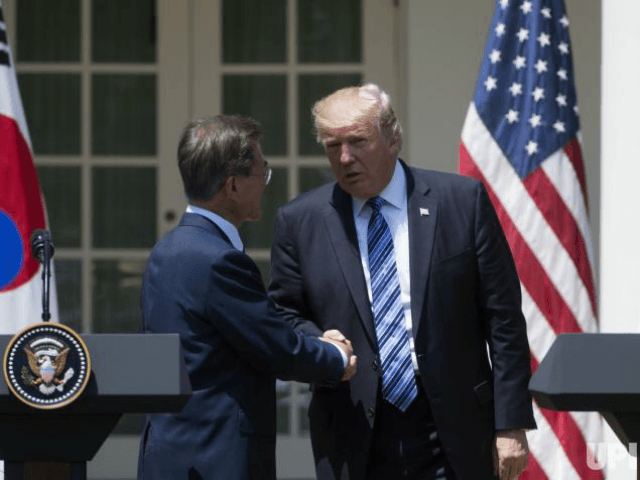South Korea’s President Moon Jae-in gave a press conference on Wednesday in which he said President Donald Trump “deserves big credit for bringing about the inter-Korean talks” held this week.
“I want to show my gratitude. It could be a resulting work of the U.S.-led sanctions and pressure,” said Moon. He stressed there is “no difference in our opinions with the U.S., which is why the U.S. is fully supporting talks, expressing their wish this can help resolve the North Korea nuclear issue.”
The South Korean president’s remarks will be welcomed in Washington, where there has been some concern that North Korea is seeking to break up the international coalition aligned against its nuclear weapons program.
Pyongyang is rather obviously trying to use the Olympic talks to push the United States out of the picture, reframing the discussion as a matter to be settled exclusively by the two Koreas. The North Korean delegation to the talks held in Panmunjom on Tuesday made a point of declaring that its weapons are not aimed at Russia, China, or South Korea, and expressed interest in further talks and better relations with South Korea, provided the South Koreans do not say anything about the North’s nuclear weapons.
Moon, who campaigned on establishing better relations with North Korea, firmly rejected these demands and made it clear he will not allow Pyongyang to use diplomatic feints to run out the clock on its drive for nuclear missiles.
“This initial round of talks is for the improvement of relations between North and South Korea. Our task going forward is to draw North Korea to talks aimed at the denuclearization of the North,” he said.
Moon described denuclearization as “our basic stance that will never be given up” and said, “The purpose of it shouldn’t be talks for the sake of talks.”
“We cannot say talks are the sole answer. If North Korea engages in provocations again or does not show sincerity in resolving this issue, the international community will continue applying strong pressure and sanctions,” he said.
“War must not break out on the Korean Peninsula again,” the South Korean president declared. “My goal is to resolve the North Korean nuclear problem and solidify peace during my term.”
This is perfectly in line with the U.S. position, which has consistently included a demand that North Korea refrain from further ballistic missile or nuclear warhead tests to prove it is serious about negotiating further.
At a State Department press briefing on Tuesday, Undersecretary for Public Diplomacy Steven Goldstein referred to a January 4 call between Presidents Trump and Moon at which “the two leaders also agreed to continue the campaign of maximum pressure on North Korea toward the goal of complete and verifiable denuclearization of the Korean Peninsula.”
“We are confident the Republic of Korea will host a safe, secure, and successful Winter Games. Anything that lowers tensions on the Korean Peninsula is a positive development. We’re in close consultation with the Republic of Korea to ensure North Korea’s participation in the Olympics does not violate U.N. Security Council sanctions,” Goldstein said.
The undersecretary described the Panmunjom conference as a “positive development” and said North Korea’s desire to participate in the Winter Olympics is encouraging, but the United States still insists on “complete, verifiable, and irreversible” denuclearization. He expressed confidence that South Korea shares the U.S. view, and assured reporters the Trump administration has no problem with Seoul encouraging North Korea to participate in the Olympics.
“We welcome any conversation that occurs as long as there is an understanding that they do not violate the sanctions imposed by the U.N. Security Council over North Korea’s unlawful nuclear and ballistic missile programs. But each step forward allows us to hopefully get to where our ultimate goal is,” said Goldstein.
Goldstein deferred questions about whether the North’s participation requires suspension or violation of the tough sanctions against Pyongyang, and how long the U.S. and South Korea are willing to suspend military exercises loathed by the North Koreans.
The impression was given of an olive branch extended cautiously to North Korea, and hope for a positive substantive response that will be different from their belligerent and defiant rhetoric. Goldstein explicitly advised one reporter to avoid reading too much into anything North Korea has said or done so far with respect to the Olympics, or to American gestures such as suspending military exercises for the duration of the Games.

COMMENTS
Please let us know if you're having issues with commenting.